My Story
Every one of us has a story and our stories reveal who we are and what we are about. Our stories are built from those experiences that show themselves to us to learn the lessons we are meant to learn. These experiences influence us because every one of them creates an opportunity to look at why we do the things we do, why we react the way we react and why we feel the way we feel. At the core of our story is our personal program built on the agreements we have made about how we should show up in the world. These agreements form our habits, and our habits create our belief system. Our belief system dictates how we see the world and how the world in turn sees us.
Through my story, you’ll learn how important it was for me to really understand myself, know what I believed and see examples of how those beliefs influenced the way I behaved and the decisions I made. You’ll feel my struggle in the face of adversity and follow me along my journey to the opportunities and gifts on the other side by asking the question “Could this be grace?”
To learn more about me professionally, jump to the bottom of the page.
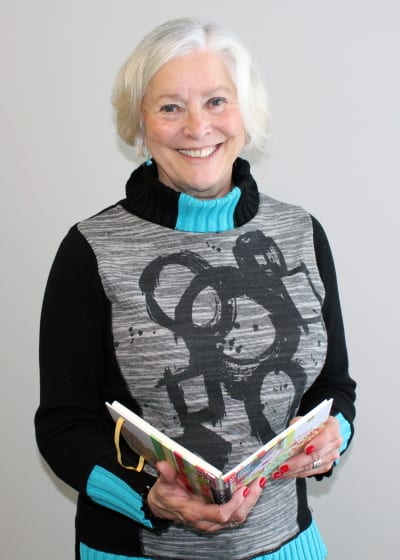
My Story's Timeline
Beginning a Family
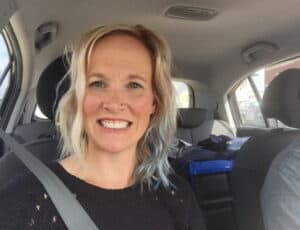
I graduated from the University of Alberta in 1975, was married that summer, and began teaching in a small rural school in Parkland School Division. My daughter, Maren, was born June of 1979. My marriage ended two years later and my teaching assignment was now in a much larger school and I joined the local running club.
June, 1979Second Chance for a Family
Shortly after joining the running club, I met my soul mate Roy. Roy was also a teacher in Parkland School Division working at a different school. We were married in June 1982. We had two sons, Erik born in 1983 and Ben 4 years later 1987.
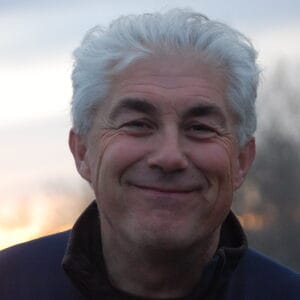
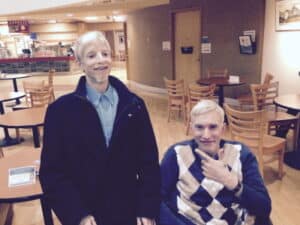
Life Changes
In their very early years, both Ben and Erik required many operations to treat an aggressive retinal disease. As Ben’s vision health deteriorated, we began to realize that he was likely going to lose his vision. As a result, I left teaching to pursue graduate studies at the University of Alberta.

Graduate Studies
I completed a Master’s degree in severe disabilities, a Ph.D in educational psychology and became a registered psychologist in 1998. I was focused on educational practice to support students with diverse learning needs. This was my passion.
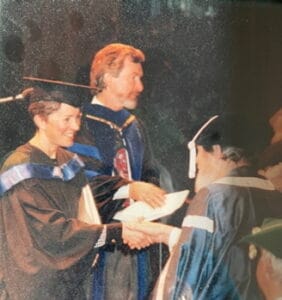
New Career Path
During my studies, I worked as an educational consultant supporting students identified with visual impairments. After graduating I worked with Battle River School Division as their Special Education Coordinator and later moved to Wetaskiwin School Division as the Director of Educational Services.
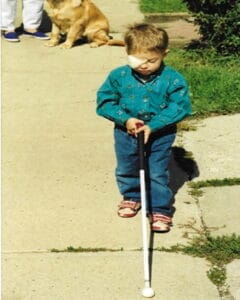
Opportunity
In addition to pursuing graduate studies and taking on new career opportunities, I was also very active in as a volunteer. As a result, I acquired over twenty years of experience as a volunteer with the Canadian National Institute for the Blind (CNIB). During this time, I filled a number of roles including, research activities, committee work, volunteering at CNIB events as well as extensive governance experience provincially and nationally.
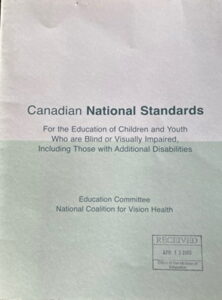
Leading Inclusion
During my time at Alberta Education, I worked as a senior program manager and later became the Director of Inclusive Learning Supports Branch. The Inclusive Learning Supports Branch provided the leadership for a major review of special education in the province and as this project unfolded, I had the privilege of becoming the project lead. Our project developed a framework called, Setting the Direction which outlined the design for the development of an inclusive education system. This framework was approved by government for implementation.

Back to Schools
Shortly after the government released their recommendations for implementation of Setting the Direction, I had the opportunity to return to a school division. This time as an Associate Superintendent of Learning Services. I was focused on leading the work of building an inclusive education system.
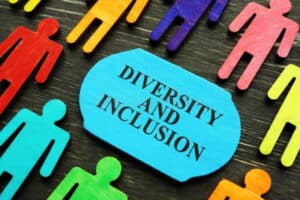
Teaching Graduate Students
Over the past couple of years, I have had the privilege of teaching at the graduate level. I’ve taught courses on how to support teachers in the interpretation of psycho-educational reports, leading inclusion, research design and writing research papers.

Selected Accomplishments
I am excited to report that I was nominated for YWCA’s Women of Distinction Award. I was the recipient of the R.W. Purse Doctoral Fellowship and the recipient of a number of awards during my time at Alberta Education.
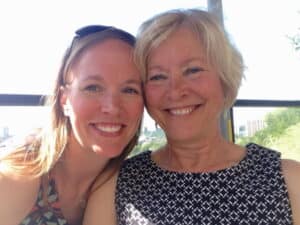
My Story - Professionally
As a registered psychologist and educator, I have over 35 years of broad experience in increasingly complex and multi-dimensional aspects of serving children, students and their families from a variety of perspectives, that include: parent, classroom teacher, consultant, central office administrator, senior leader within government and board member within a national service organization. At some point in our lives, most of us will encounter adverse experiences in some form or other. These experiences likely interrupt our comfortable and safe daily routines and can be unpleasant and painful.
Could This Be Grace is a powerful story about my personal journey through multiple adverse experiences created by raising two boys who died from a devastating, very rare genetic disease. I describe many experiences as painful, crushing, breath-stealing moments that had a huge impact on her life and the lives of family members. By reading this book, you will not only learn about the impact and experience of adversity and loss but you will gain wonderful insights on how to become resilient and hang onto hope during troubled times. This book teaches us to ask the right questions and to focus on the things that we are meant to focus on. The lessons I learned as a result of my situation had a positive impact on my life and reading this book will have a positive impact on your life.
Inclusion: Not Just an Educational Buzzword weaves my personal journey and stories along with my experience as an educator and influences from researchers to form this necessary and important call to action. If we truly want to live and work in a community that believes relationship and connection are priorities, then we must pay attention to the important lessons of being, knowing and doing within our homes, classrooms and communities. The being piece is the most difficult to understand, and I trust that it shows us how to get to being.
Reading this book will assist you in seeing the important personal and systemic transformational changes that are necessary to not only show up as our best selves, but to live and work as compassionate partners with our family, neighbours, colleagues and students.
The time is now, and this call is for you.